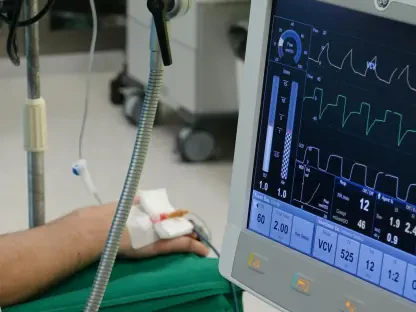In a world where feline health faces persistent threats from diseases like Feline Leukemia Virus (FeLV), a retrovirus notorious for causing severe conditions such as immunosuppression, anemia, and lymphoma, the arrival of a groundbreaking diagnostic tool offers new hope for veterinarians and cat owners alike. This virus has long challenged the veterinary community due to its ability to spread silently among feline populations, often evading detection until symptoms become severe. Accurate and timely diagnosis remains the cornerstone of managing FeLV, preventing its transmission, and improving outcomes for affected cats. Enter Vet Expert, a novel rapid diagnostic test designed to detect FeLV antigens with unparalleled precision in blood, plasma, and serum samples. This advancement promises to revolutionize point-of-care testing in veterinary settings, addressing long-standing gaps in diagnostic reliability. The significance of this development extends beyond individual cat care, potentially reshaping disease control strategies on a broader scale. As FeLV continues to impact cats globally, particularly in high-risk environments like shelters, the introduction of Vet Expert marks a pivotal moment in the ongoing effort to safeguard feline health through cutting-edge technology and innovation.
Understanding the Persistent Threat of FeLV
The global impact of Feline Leukemia Virus on cat populations cannot be overstated, as it remains one of the most significant health challenges in veterinary medicine since its identification decades ago. This retrovirus compromises the immune system, leaving cats vulnerable to a host of secondary infections and life-threatening conditions like lymphoma. Its prevalence is particularly alarming in multi-cat settings such as shelters or catteries, where close contact facilitates rapid transmission. Historical data and contemporary studies alike emphasize the virus’s enduring presence, with many regions reporting sustained infection rates despite efforts to control its spread. The clinical complexity of FeLV, including its ability to remain latent in some cats, further complicates diagnosis and management, often delaying critical interventions. This persistent threat drives the urgent need for diagnostic tools that can reliably identify infected individuals before the disease progresses or spreads to others, highlighting the critical role of advancements in veterinary science.
Beyond the immediate health risks to individual cats, FeLV poses a broader challenge to feline welfare on a population level, necessitating robust strategies for prevention and control. The economic and emotional toll on cat owners and rescue organizations adds another layer of urgency to addressing this issue. Many cats diagnosed late face limited treatment options, while the risk of transmission in communal environments can lead to heartbreaking decisions about isolation or euthanasia. Veterinary research has long focused on improving diagnostic capabilities to tackle these challenges, with each advancement building on the lessons of past efforts. The ongoing struggle against FeLV underscores the importance of innovative solutions that can bridge the gap between clinical need and practical application, ensuring that veterinarians are equipped to protect both individual animals and entire communities from the virus’s devastating effects.
Revolutionizing Diagnostics with Point-of-Care Testing
Point-of-care testing has emerged as a transformative approach in veterinary care, enabling veterinarians to make swift, informed decisions without the delays associated with traditional laboratory methods. For a disease like FeLV, where early detection can significantly alter outcomes, the ability to obtain immediate results in a clinic or field setting is invaluable. Rapid diagnostic tests have become essential tools, particularly in environments with limited access to specialized facilities, allowing for prompt identification of infected cats and the implementation of necessary precautions. However, the effectiveness of these tests has historically varied, with inconsistencies in accuracy creating uncertainty for practitioners. This variability often leaves veterinarians grappling with the risk of misdiagnosis, which can have serious consequences for both the affected cat and others in close proximity, emphasizing the need for a more dependable solution.
Vet Expert addresses this critical gap by offering a rapid diagnostic test that combines ease of use with exceptional reliability, setting a new standard for point-of-care FeLV detection. Designed for seamless integration into busy veterinary practices, this test delivers results quickly without requiring complex equipment or extensive training. Its user-friendly nature ensures that even in high-pressure situations, veterinarians can confidently rely on the outcomes to guide their clinical decisions. This advancement reduces the burden of diagnostic uncertainty, allowing for faster responses to FeLV cases, whether through treatment, isolation, or owner education. By enhancing the speed and accessibility of accurate testing, Vet Expert empowers veterinary professionals to act decisively, improving the overall quality of care provided to feline patients in diverse clinical scenarios.
Unmatched Precision in FeLV Antigen Detection
At the heart of Vet Expert’s innovation lies its remarkable technical precision in detecting FeLV antigens across multiple sample types, including blood, plasma, and serum, making it a versatile tool for a wide range of diagnostic needs. This adaptability ensures that veterinarians can utilize the test in various contexts, from routine screenings during wellness visits to urgent assessments in emergency situations. The ability to work with different sample types without compromising accuracy is a significant advantage, as it accommodates the practical constraints often encountered in clinical settings. Moreover, the test’s design prioritizes straightforward application, minimizing the potential for user error and ensuring consistent results regardless of the environment. This technical excellence positions Vet Expert as a reliable ally in the fight against FeLV, addressing the nuanced challenges of diagnosing a virus known for its variable presentation.
When evaluated against other commercially available FeLV detection kits, Vet Expert stands out for its exceptional performance metrics, achieving 100% sensitivity, specificity, and accuracy in comparative studies. This places it on par with, or even surpassing, established benchmarks like the SNAP test, which has long been regarded as a leader in the field. Such high precision means that false positives and negatives are virtually eliminated, providing veterinarians with the confidence to make critical decisions based on the test results. This level of accuracy is particularly crucial for FeLV, where misdiagnosis can lead to unnecessary stress for owners or missed opportunities for early intervention. By setting a new bar for diagnostic reliability, Vet Expert not only enhances individual case management but also contributes to the credibility of rapid testing as a whole within the veterinary community.
Enhancing Veterinary Workflows with Practical Solutions
The practical benefits of Vet Expert extend far beyond its technical capabilities, offering tangible improvements to the daily operations of veterinary practices. As a point-of-care solution, it eliminates the need for sending samples to external laboratories, which can often delay results by days or even weeks. This immediacy allows veterinarians to discuss findings with cat owners in real time, fostering better communication and trust during consultations. The simplicity of the test’s administration further streamlines workflows, reducing the time and resources spent on diagnostic processes. In busy clinics where efficiency is paramount, such a tool can make a significant difference, enabling staff to focus on patient care rather than logistical hurdles. This practical design ensures that FeLV testing becomes a seamless part of routine and emergency care alike.
Additionally, the reliability of Vet Expert’s results enhances decision-making in clinical settings, directly impacting the quality of care provided to feline patients. Early and accurate detection of FeLV enables veterinarians to initiate appropriate interventions promptly, whether that involves medical treatment, lifestyle adjustments, or preventive measures to protect other cats. This capability is especially vital in scenarios involving newly adopted cats or those with unknown health histories, where quick diagnosis can prevent unintended transmission. By integrating such a dependable tool into their practice, veterinarians can reduce the emotional and financial strain on owners, offering clarity and actionable steps at a critical juncture. The widespread use of Vet Expert has the potential to elevate standards of feline healthcare, ensuring that more cats receive timely attention and support.
Shaping the Future of FeLV Control
The implications of Vet Expert for broader FeLV control strategies are profound, as accurate diagnostics form the foundation of effective disease management on a population level. Identifying infected cats early allows for targeted measures such as segregation from healthy animals, tailored vaccination protocols where applicable, and informed owner education on minimizing transmission risks. These steps are particularly crucial in high-risk environments like shelters and multi-cat households, where the virus can spread rapidly if unchecked. By providing a tool that minimizes diagnostic errors, Vet Expert supports veterinarians and animal welfare organizations in implementing proactive strategies that curb the virus’s impact. This approach not only protects individual cats but also contributes to reducing overall prevalence in vulnerable communities.
Furthermore, the adoption of Vet Expert could inspire a shift in how FeLV is addressed within the veterinary field, encouraging a greater emphasis on prevention and early intervention. Its ability to deliver consistent, accurate results helps build trust in rapid testing technologies, potentially influencing policy and practice guidelines over time. As more clinics and organizations integrate this tool, data collected from widespread use could inform future research and control initiatives, creating a feedback loop of continuous improvement. This diagnostic advancement also sets a precedent for innovation in tackling other feline diseases, demonstrating the value of precision and practicality in veterinary diagnostics. Ultimately, Vet Expert’s role in shaping FeLV control extends beyond immediate clinical benefits, paving the way for long-term progress in feline health management.
Reflecting on a Milestone in Veterinary Innovation
Looking back, the development and validation of Vet Expert stand as a landmark achievement in the ongoing effort to combat Feline Leukemia Virus, addressing both the clinical and societal challenges posed by this pervasive disease. Its unmatched accuracy, with 100% sensitivity and specificity, matches the performance of leading tests while offering the added advantage of point-of-care accessibility. This balance of precision and practicality marks a significant step forward for veterinary diagnostics, ensuring that veterinarians can trust the results they obtain in real time. The impact of this tool is felt across diverse settings, from small practices to large shelters, where it facilitates timely interventions and informed decision-making. As a result, countless cats benefit from earlier detection and management of FeLV, while the risk of transmission in communal environments is notably reduced.
Moving forward, the legacy of this diagnostic breakthrough should inspire continued investment in rapid testing technologies, with a focus on expanding access to such tools in underserved regions. Stakeholders in veterinary medicine are encouraged to advocate for the integration of Vet Expert into standard protocols, ensuring that its benefits reach as many feline patients as possible. Additionally, future research could explore adaptations of this technology for other infectious diseases, building on the foundation laid by this innovation. Collaborative efforts between diagnostic developers, veterinarians, and animal welfare groups will be essential to sustain momentum and address emerging health threats. This milestone serves as a reminder of the power of targeted innovation to transform animal care, offering a blueprint for tackling complex challenges in the years ahead.









